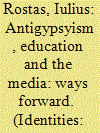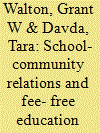| Srl | Item |
| 1 |
ID:
157082


|
|
|
|
|
| Summary/Abstract |
This article is a self-reflection of my work over a decade of challenging school segregation of Roma across Europe. I look at how segregation has been framed and how communication around equality in education with the public took place. The education system is an important pillar in producing and reproducing antigypsyism in society. I see school segregation as an important mechanism that perpetuates antigypsyism. I explore ways to attract support for equality measures in education. One important strategy is to engage with media in transmitting messages to an audience that was usually not the target of inclusive discourses that promote diversity and equality as societal values.
|
|
|
|
|
|
|
|
|
|
|
|
|
|
|
|
| 2 |
ID:
145999


|
|
|
|
|
| Summary/Abstract |
This paper explores the parallel experiences of Black and Brown Americans which are often regarded as mutually exclusive. In discussing the divergent but similar histories of Chicanos and Afro-Americans, I utilize the notion of ‘improvisation’, a re-examination of the 1930 desegregation court case, Roberto Alvarez v. Lemon Grove focusing on how Jim Crow laws also affected the Mexican American Southwest as José Crow custom. Utilizing George Bond’s critical narrative, I argue that the Black/Brown struggle is co-joined in history and the social justice movement. In the Bond tradition, my aim here is to refresh our historical understanding and also to reinvigorate the Black/Brown dialogue.
|
|
|
|
|
|
|
|
|
|
|
|
|
|
|
|
| 3 |
ID:
163468


|
|
|
|
|
| Summary/Abstract |
While international and Pacific scholarship suggests that communities can play a significant role in improving access to schooling as well as school funding, infrastructure, and resources, there is little research on how school-community relations shape the implementation of fee-free education policies. This is particularly the case in the Pacific region. In Papua New Guinea, communities play a significant role in determining school funding, infrastructure, and access, but their role in implementing the country's fee-free education policy (introduced in 2012) is poorly understood. Drawing on data from two provinces with very different capacities for service delivery, this paper shows that school-community relations vary significantly, and are crucial for managing challenges associated with the country's tuition fee-free (TFF) policy, particularly in regards to access to schooling and improving school funding, infrastructure, and resources. While communities have helped advance the TFF policy's goals, conflict over land, the charging of fees, and the board of management (BOM)—a key local governance body—has, in some cases, undermined national efforts to increase enrollments and make up for the loss of school income from tuition fees. This paper argues that academics and policy makers need to pay greater attention to the sustainability of fee-free education policies, geographical variation, and the improvement of school-community relations. Doing so will require overcoming the tendency to focus on national-level indicators of success associated with fee-free education policies.
|
|
|
|
|
|
|
|
|
|
|
|
|
|
|
|